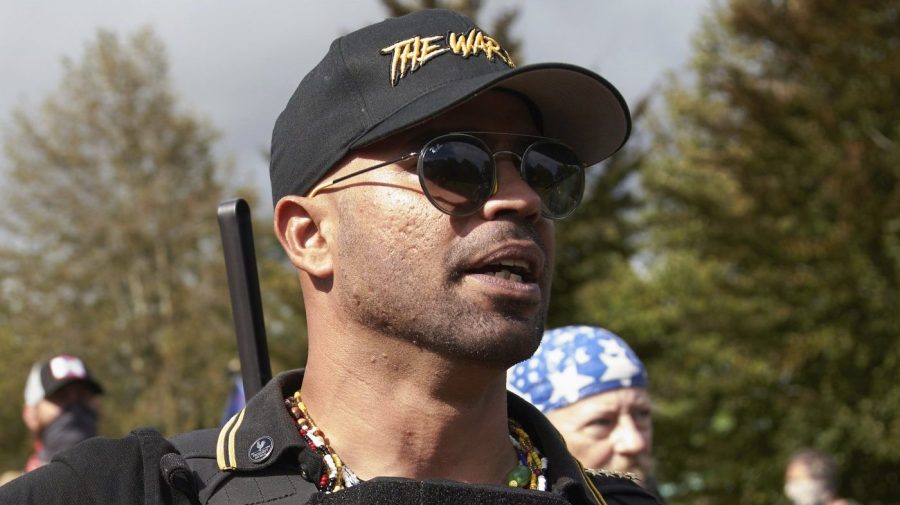
Former Proud Boys national chairman Enrique Tarrio delivered combative and at times contradictory testimony Thursday as a star witness in the defense of a retired police officer accused of leaking law enforcement intel to the right-wing extremist group leader.
Tarrio flatly refuted key elements of the Justice Department’s case against Metropolitan Police Department (MPD) Lt. Shane Lamond, including that the officer warned him about an arrest warrant for burning a stolen Black Lives Matter banner and later tipped him off to his imminent arrest.
But he refused to acknowledge messages suggesting otherwise on cross-examination, instead seeking to fluster the prosecutor and undermine evidence by suggesting his own sedition trial proved prosecutors cannot be trusted to present accurate information.
Seconds into his cross-examination, Tarrio declined to answer any questions about the Jan. 6, 2021, Capitol attack that boosted his notoriety.
“It’s just not happening,” said Tarrio, who is serving a 22-year prison term for seditious conspiracy after plotting to halt the peaceful transfer of power from then-President Trump to Joe Biden after the 2020 election.
U.S. District Judge Amy Berman Jackson in a federal courtroom in Washington, D.C. threatened to strike his whole testimony or hold him in contempt, reminding the right-wing extremist group leader that he waived his Fifth Amendment protection against self-incrimination when he decided to take the stand.
Tarrio said he’d be “okay” with those penalties, to proceed as he wished. The judge said she wasn’t.
“We will agree to disagree,” Tarrio replied.
Tarrio wore a green inmate’s jumpsuit and black, thick-rimmed glasses, scanning the gallery jam-packed with reporters, law enforcement and members of the public as he entered the courtroom and during his testimony.
The ex-Proud Boys leader did not testify during his Jan. 6 trial, though several co-defendants did. Jackson, the judge, said a previous delay in Lamond’s trial was the result of Tarrio wishing to wait for the outcome of November’s presidential election before deciding whether to testify.
Trump, who is now president-elect, has vowed to pardon Jan. 6 rioters — and floated considering a pardon for Tarrio.
During his testimony, Tarrio said his communication with Lamond began in summer 2019 with the objective of keeping fellow Proud Boys and Trump supporters safe at events by creating a “buffer zone” between them and protestors.
Lamond was neither a Proud Boy nor a friend, Tarrio said, though he stopped short of denying that the officer supported the group.
“I can’t tell you what Shane was or wasn’t,” he said. “He wasn’t a Proud Boy.”
Tarrio denied confessing to Lamond, pointing prosecutors to podcast and social media confessions he said stood alone. The government alleges Tarrio confessed to Lamond and that the officer withheld that information from his superiors.
He explained away the contradictory messages he sent to various people as a “marketing ploy” to encourage contacts with big followings to blast the information, or as testing out messaging among other Proud Boys.
Tarrio also roundly resisted prosecutors’ theory that Lamond informed Tarrio of his Jan. 4, 2021, arrest. That day, Lamond set his Telegram chat with Tarrio to self-destruct after 10 seconds; soon after, Tarrio told several contacts that the warrant for his arrest was signed.
However, Tarrio did admit to several details prosecutors say are damaging to Lamond’s defense. Tarrio initially said that Lamond was not his “source” at MPD, but later agreed that he was a “contact” at the police department — words Tarrio used interchangeably in his messages.
Prosecutors also played a video showing Tarrio meeting in a parking garage with members of other right-wing groups, including Oath Keepers founder Stewart Rhodes. In the video, Tarrio says he became aware his arrest warrant had been signed “in the air…They texted me from the air.”
Tarrio admitted that the video showed him saying that, but insisted the person who texted him was not Lamond and that he didn’t actually know then that the warrant had been signed. He told defense attorney Mark Schamel that he became suspicious after departing the plane but wasn’t sure he’d be arrested until unmarked police cars began following his ride-share into Washington, D.C.
Assistant U.S. Attorney Rebecca Ross questioned why the judge, who will alone decide Lamond’s fate, should believe that all of Tarrio’s messages were lies, but he was telling the truth Thursday in the same court where he was convicted of sedition and other serious felonies.
“Well, I wasn’t convicted of perjury,” Tarrio retorted.

